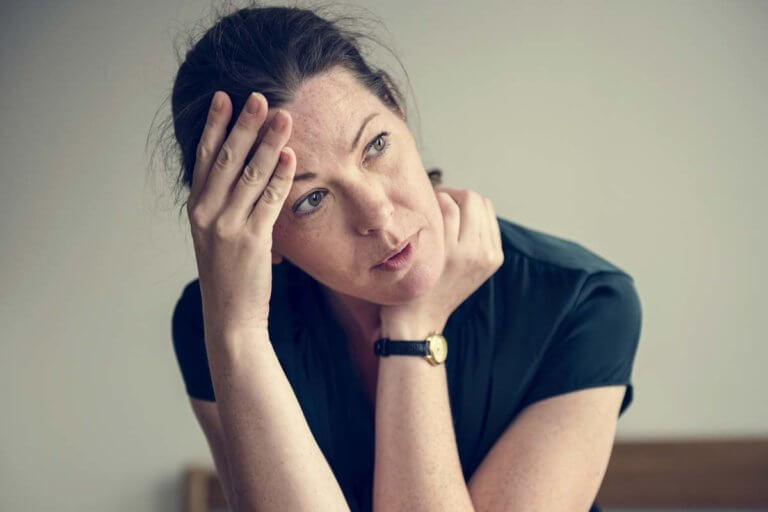Though you may feel alone when dealing with depression and anxiety, these are two of the most common mental health conditions. When people turn to harmful, mind-altering chemicals to help them cope with depression and anxiety, this is a sign that assistance is needed. Helping people cope with depression and anxiety alongside addiction recovery is one of our specialties at Liberty Bay. If you feel like depression or anxiety are holding you back from getting sober, you are not alone. Contact Portland Maine’s Liberty Bay Recovery to reach an addiction treatment intake specialist.
What Is Depression?
Depression is a persistent sadness that is not caused by external circumstances. Depression affects your mood, self-esteem, outlook on life, and ability to function. While these feelings may come and go, they are present most of the time. Losing interest in activities you once enjoyed is a sign of depression. People struggling with depression are at risk of developing substance use disorder because many dangerous drugs appear to relieve symptoms of depression in the short term.
What Is Anxiety?
Anxiety involves inescapable worrying that impedes daily life. It can be the result of PTSD or a chemical imbalance. Untreated anxiety can result in panic attacks and difficulty coping with stress and change. While many drugs appear to cure anxiety in the short term, they are often habit-forming and impair thinking, speech and judgment in the long term.
Self-Medicating in Response to Anxiety and Depression
Many people don’t realize how many of their actions are governed by anxiety and depression. Opioids, benzodiazepines, stimulants, and alcohol may alleviate symptoms of anxiety and depression in the short term, but the brain becomes reliant on these substances over time, regardless of the harmful impacts they have on the brain and ability to function. Your depression and anxiety can indeed have a linear correlation as symptoms of your addiction. However, depression and anxiety are separate illnesses, and therapists and doctors should treat them as such. This is especially true if you had a history of depression and anxiety before you became aware of your addiction.
Signs You Are Dealing With Depression and Anxiety
It may be difficult to tell if you are dealing with depression and anxiety. This difficulty is because it is likely that you experience anxiety and depression differently than someone else. There are, however, some tell-tale signs of each.
You may experience one or more of the following if you have anxiety:
- Struggling to concentrate
- Unusual muscle tension
- Not being able to relax
- Racing thoughts
- Feeling irritable
- Feeling as though you cannot fall or stay asleep
These are just a few common symptoms. However, anxiety takes form in many other ways. We can help you determine if what you are experiencing is anxiety. Discover more about our anxiety treatment services at the Liberty Bay Recovery Center.
If you are experiencing depression, you may feel some of the following:
- Feeling as though you want to harm yourself
- Having suicidal ideations
- Struggling to concentrate or think clearly
- Having thoughts that you are worthless
- Not having an interest in what you used to enjoy
- Feeling as though you are tired all the time
Like anxiety, depression symptoms are experienced and interpreted differently by everyone. Let us help you work through depression. Find out more about the depression treatment services we have to offer.
Is Your Addiction Because of Anxiety and Depression or the Other Way Around?
According to a study released by the Anxiety and Depression Association of America (ADAA), addiction and mental disorders are a two-way street. The study concludes that you are over 20% more likely to suffer from anxiety and depression if you have a substance use disorder. They also recommend that patients get specialized treatment for anxiety and depression in conjunction with addiction recovery. This is called a dual diagnosis.
Many people begin the use of a substance to cope with symptoms of anxiety and depression. However, your addiction will likely only feed your anxiety and depression symptoms. This may cause you to end up in a cycle of dependency because self-medicating with substances has become your norm to function. Whether the substance you are using is an upper or a downer will also play a role in how it affects your depression and anxiety.
It is best not to think of addiction, anxiety, and depression as being dependent on one another. You could have all of these disorders or just one. No matter how you experience any one of these, it is essential to know that you are not alone. You have a safe place to go for addiction recovery in Portland, ME.
How Liberty Bay Recovery Center Can Help
Your mental health plays a part in all aspects of your life. The first step to getting to a headspace where you are content and able to live your life with joy is to experience your baseline with sobriety. From there, you can effectively treat your anxiety and depression. Liberty Bay has a variety of options when it comes to addiction recovery in Portland, ME.
Join Our Portland, Maine Community of Recovery
Liberty Bay’s Recovery center provides a therapeutic community. You will find in-patient services, outpatient services, detox programs, and a variety of therapies to help you get on the road to recovery. Contact us at (855) 607-8758 to take the next steps in recovery and get the tools you need to deal with depression and anxiety.



